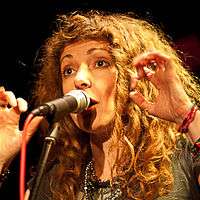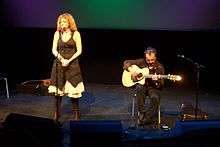Nolwenn Korbell
Nolwenn Korbell (French pronunciation: [nɔlwɛn kɔʁbɛl]; born 3 February 1968 in Quimper, Finistère), is a French Breton singer-songwriter and actress. Best known for her songs in Breton, with her musicians or in a duet with guitarist Soïg Sibéril, she released four albums, regularly performs in concerts, and also keeps acting in plays and films.
Nolwenn Korbell | |
|---|---|
 Nolwenn Korbell in Gouesnach | |
| Background information | |
| Born | 3 February 1968 Quimper, France |
| Genres | Breton singing |
| Occupation(s) | Singer-songwriter, actress |
| Instruments | Vocals, guitar |
| Years active | 1984–present |
| Labels | Coop Breizh |
| Website | http://www.myspace.com/nolwennkorbell |
Biography
Nolwenn Korbell spent her childhood in Douarnenez[1] with her younger brother and her parents, gwerz singer Andrea Ar Gouil and Hervé Corbel, also a Breton music amateur. All four of them spoke Breton in their daily life, and Nolwenn learnt French at school. She followed her mother during her tours in the Celtic nations, where she heard Welsh, Irish and Scottish people sing in their respective languages.
She began taking theatre classes in her teens.[2] At 16, she played in sketches during the Nuit des Raouls, a pastiche of the César Awards ceremony. Youenn Gwernig, the head of Breton language programs of France 3 Ouest, noticed her. In 1984, France 3 bought the rights of a Welsh cartoon in order to dub it in Breton, and Gwernig gave her the female character's role.[3]
During two years, she studied modern languages at University of Rennes 2, learning German, Breton and Welsh.[4] She spent three years in the Dramatic Arts Conservatory in Rennes, learning lyrical singing, and performing as a soprano in the band Arsis Théâtre Vocal.[2] She hosted television programs on France 3 Ouest.[5]
Between 1991 and 1999, she lived between Brittany and Wales, the home land of her partner, Twm Morys. She sang in his band, Bob Delyn a'r Ebillion.[2] At that time, she played in short and long films by Olivier Bourbeillon, Simon Hymphries.[5] In 1997, she competed in the Kan ar Bobl, a Breton singing contest that brought to fame, among others, Yann-Fañch Kemener[6] and Denez Prigent.[7] There, she sang Ma c'hemenerez (My seamstress), a song she wrote as a tribute to her grandmother, and won the first prize. In 2000, after the birth of her son Gwion, she went back to France in order to devote herself to theatre and singing.[8]
In 2002, she sang during the Tombées de la Nuit. The two heads of Coop Breizh were in the audience and offer her to record an album.[8]
Music

N'eo ket echu
N'eo ket echu (It is not over), her first album, was released in the end of 2003. This title was chosen so that anyone can find their own meaning in it: it can, for example, refer to the end of a love relationship that leaves some hope, to the Breton language and culture that are still alive, or to a work of art, like the album itself, that is never over because it is always possible to give a new interpretation of it.[4]
All the songs are in Breton, except Y byd newydd ("The new world"), which is in Welsh. All the lyrics were by Nolwenn Korbell, except those of Plac'h ar gwele kloz ("The girl of the closed bed", by Bernez Tangi), Y byd newydd (Twm Morys) and Deuit ganin-me ("Come with me", traditional). Korbell cited as her main source of inspiration the songs, often from the Barzaz Breiz, that her mother sang to her.
She wrote using simple words, following the example of Bernez Tangi, who, in addition to a song, wrote the poem that serves as a preface to N'eo ket echu. Because of her training as an actress, she took great care of pronouncing correctly, which is part of her effort in making her songs understandable by the largest audience.[3] She expressed one of her strongest convictions: the importance of Breton, and of languages in general: "I would like the world to keep all the colours that are under the sun", she said in an interview.[9]
She included in the album "Deuit ganin-me", a traditional song that her mother taught her, also sung by the Goadec sisters.
Another traditional theme is the subject of "Son ar plac'h n'he doa netra" (Song of the girl who had nothing), inspired from a nursery rhyme designed to teach children the days of the week, the name of farm animals and the sound they make: everyday, the narrator goes to the fair and buys an animal. In Nolwenn Korbell's version, starting on Wednesday, the narrator buys something that cannot be bought: a husband, a son, a heart, a voice and a life. According to the author, "this song is a parable which demonstrates that what makes the salt of life is not negotiable".[3]
The band that performed on N'eo ket echu included Frédérique Lory on the piano, Tangi Le Doré on the bass, and d'Antonin Volson on drums. This team remained with her until 2010.
This album received France 3's Priz (award) of the best CD in 2003 and the Produit en Bretagne (made in Brittany) disc grand award in 2004.[5] In 2004, Nolwenn Korbell received the Imram award, given each year to a Breton language author for his or her whole work.[10]
Her shows were produced by Big Bravo Spectacle, a company based in Saint-Quay-Portrieux.[11] She sang in many events, such as the Vieilles Charrues Festival in 2004, the Festival du bout du monde, the Nuit celtique in Bercy in 2005 and 2006. In 2006, she performed in the Celtic Connections festival in Glasgow and a concert in Olympia with Gilles Servat.
Albums
N'eo ket echu
2003, Coop Breizh
- Ur wech e vo
- Padal
- Ma c'hemenerez
- Glav
- Y byd newydd
- Son ar plac'h n'he doa netra
- Luskell ma mab
- A-dreuz kleuz ha moger
- Deuit ganin-me
- Sant ma fardon
Bemdez c'houloù
2006, Coop Breizh
- Bemdez choulou
- Termaji
- Dal
- Valsenn Trefrin
- News from town for my love who stayed home
- Yannig ha mai
- Pardon an dreinded
- Dafydd y Garreg Wen
- Un petit navire d'Espagne
- Olole
Red
(with guitarist Soig Sibéril), 2007, Coop Breizh
- Bugale Breizh
- Valsenn trefrin
- Billy
- Sant ma fardon
- Gourin
- Padal
- Anna
- Bemdez choulou
- Daoulamm ruz
- Kanaouenn Katell
- Turn! Turn! Turn!
- Yannig ha mai
- Glav
- News from town for my love who stayed home
Noazh
2010, Coop Breizh
- Blues ar Penn Sardin
- Hir
- Mad Love
- Aet Oan
- An Dud
- Don't Try
- Anna
- Je Voudrais
- Kuit
- One More Day
- Misjac Na Nebi
References
- Portrait de Nolwenn Korbell, page 1 (in French), Au pays bigouden, archived from the original on 25 March 2009, retrieved 11 May 2010
- Frédéric Jambon, "Nolwenn Korbell. "Bemdez c'houloù"", Le Télégramme (in French), archived from the original on 13 July 2011, retrieved 11 May 2010
- David Raynal, Pure Breizh – Nolwenn Korbell raconte son prodigieux parcours de nouvelle sensation du chant breton. (in French), World Musiques Destinations, archived from the original on 21 November 2008, retrieved 1 May 2010
- Lollier, Ronan (January 2004), "Entretien : Nolwenn Korbell" (PDF), Musiques et danses en Finistère (in French) (38), pp. 3–4, archived from the original (pdf) on 7 November 2007, retrieved 19 April 2010
- Nolwenn Korbell une artiste bretonne bretonnante engagée et bourrée de talents (in French), Agence Bretagne Presse, archived from the original on 4 December 2009, retrieved 11 May 2010
- Jérémie Pierre Jouan, Yann-Fañch Kemener – Biographie chronologique (in French), archived from the original on 4 June 2002, retrieved 11 May 2010
- Frédéric Jambon, Denez Prigent. "Sarac'h" : Grand Prix du Disque du Télégramme (in French), Le Télégramme, archived from the original on 25 November 2007, retrieved 11 May 2010
- Portrait de Nolwenn Korbell, page 2 (in French), Au pays bigouden, archived from the original on 2 May 2009, retrieved 11 May 2010
- "O livañ ar bed" (PDF), Finistère Penn ar Bed (in Breton) (91), p. 18, March 2005, archived from the original (pdf) on 20 July 2011, retrieved 11 May 2010
- Prix IMRAM en langue bretonne (in French), Maison Internationale des Poètes et des Écrivains de Saint Malo, archived from the original on 18 November 2008, retrieved 14 May 2010
- Booklet of N'eo ket echu